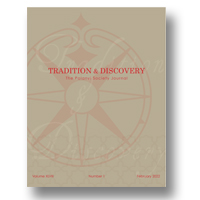|
contents |
|
1.
|
Tradition and Discovery: The Polanyi Society Periodical:
Volume >
32 >
Issue: 2
Phil Mullins
Preface
view |
rights & permissions
| cited by
|
|
|
|
|
2.
|
Tradition and Discovery: The Polanyi Society Periodical:
Volume >
32 >
Issue: 2
News and Notes
view |
rights & permissions
| cited by
|
|
|
|
|
3.
|
Tradition and Discovery: The Polanyi Society Periodical:
Volume >
32 >
Issue: 2
Information on Polanyi Society Electronic Discussion List
view |
rights & permissions
| cited by
|
|
|
|
|
4.
|
Tradition and Discovery: The Polanyi Society Periodical:
Volume >
32 >
Issue: 2
2005 Polanyi Society Annual Meeting Minutes
view |
rights & permissions
| cited by
|
|
|
|
|
5.
|
Tradition and Discovery: The Polanyi Society Periodical:
Volume >
32 >
Issue: 2
2006 Polanyi Society Annual Meeting Call for Papers
view |
rights & permissions
| cited by
|
|
|
|
|
6.
|
Tradition and Discovery: The Polanyi Society Periodical:
Volume >
32 >
Issue: 2
Polanyi Society Financial Statement
view |
rights & permissions
| cited by
|
|
|
|
|
articles |
|
7.
|
Tradition and Discovery: The Polanyi Society Periodical:
Volume >
32 >
Issue: 2
Phil Mullins
Harry Prosch 1917-2005
abstract |
view |
rights & permissions
| cited by
This is an obituary notice for Harry Prosch, the American philosopher who collaborated with Michael Polanyi to publish Meaning in 1975.
|
|
|
|
|
contents |
|
8.
|
Tradition and Discovery: The Polanyi Society Periodical:
Volume >
32 >
Issue: 2
WWW Polanyi Resources
view |
rights & permissions
| cited by
|
|
|
|
|
articles |
|
9.
|
Tradition and Discovery: The Polanyi Society Periodical:
Volume >
32 >
Issue: 2
PhiI Mullins, Marty Moleski
Harry Prosch:
A Memorial Re-Appraisal of the Meaning Controversy
abstract |
view |
rights & permissions
| cited by
This essay traces the history of Harry Prosch’s work with Michael Polanyi. It analyzes the Prosch-Polanyi archival correspondence as well as other correspondence records in an effort to make clear the scope and nature of Prosch’s work in their collaboration on Meaning, a book published under both names at a late stage of Polanyi’s life when his mental capacities were diminished.
|
|
|
|
|
contents |
|
10.
|
Tradition and Discovery: The Polanyi Society Periodical:
Volume >
32 >
Issue: 2
Notes on Contributors
view |
rights & permissions
| cited by
|
|
|
|
|
articles |
|
11.
|
Tradition and Discovery: The Polanyi Society Periodical:
Volume >
32 >
Issue: 2
Tony Clark
Polanyi on Religion
abstract |
view |
rights & permissions
| cited by
This article explores Polanyi’s views on religion. Reviewing the debate on his understanding of religion, which originated in Richard Gelwick and Harry Prosch’s conflicting readings of Polanyi on the theme, the article proposes that there are ambiguities within his writings on the theme which cannot be resolved. There is a weakness in Polanyi’s work on religion which reflcets his limited experience of religious practices and theological traditions. Nevertheless, his insight that religious knowledge is rooted in the practices of religious worship is one from which theology has much to learn.
|
|
|
|
|
contents |
|
12.
|
Tradition and Discovery: The Polanyi Society Periodical:
Volume >
32 >
Issue: 2
Submissions for Publication
view |
rights & permissions
| cited by
|
|
|
|
|
13.
|
Tradition and Discovery: The Polanyi Society Periodical:
Volume >
32 >
Issue: 2
Polanyi Society Membership
view |
rights & permissions
| cited by
|
|
|
|
|
articles |
|
14.
|
Tradition and Discovery: The Polanyi Society Periodical:
Volume >
32 >
Issue: 2
Esther L. Meek
Learning to See:
The Role of Authoritative Guides in Knowing
abstract |
view |
rights & permissions
| cited by
My own ongoing reflection on the Polanyian understanding of knowing leads me to recommend that we help people acknowledge and reaccredit authority as a key feature of all human knowing. This recommendation I support in this essay by showing the following. First, I argue that reliance on authority is unavoidable. The Polanyian model, along with the complementary insights of a few others, and reflection on human experience, together show that human knowledge is what it is only by virtue of its normative component. Such normativity, I argue, requires persons as mentors and as recipients. Second, I describe some of the ins and outs of responsible reliance on authority in a way that I hope will make it a more palatable and delightful prospect, and will encourage its skillful employment. I believe that this message offers much needed epistemological therapy for philosophy and ordinary people today.
|
|
|
|
|
reviews |
|
15.
|
Tradition and Discovery: The Polanyi Society Periodical:
Volume >
32 >
Issue: 2
Paul Lewis
Minding God:
Theology and the Cognitive Sciences
view |
rights & permissions
| cited by
|
|
|
|
|
16.
|
Tradition and Discovery: The Polanyi Society Periodical:
Volume >
32 >
Issue: 2
Phil Mullins
Creationism’s Trojan Horse:
The Wedge of Intelligent Design
view |
rights & permissions
| cited by
|
|
|
|
|
17.
|
Tradition and Discovery: The Polanyi Society Periodical:
Volume >
32 >
Issue: 2
Phil Mullins
Emotion, Reason and Tradition:
Essays on the Social, Political and Economic Thought of Michael Polanyi
view |
rights & permissions
| cited by
|
|
|
|





